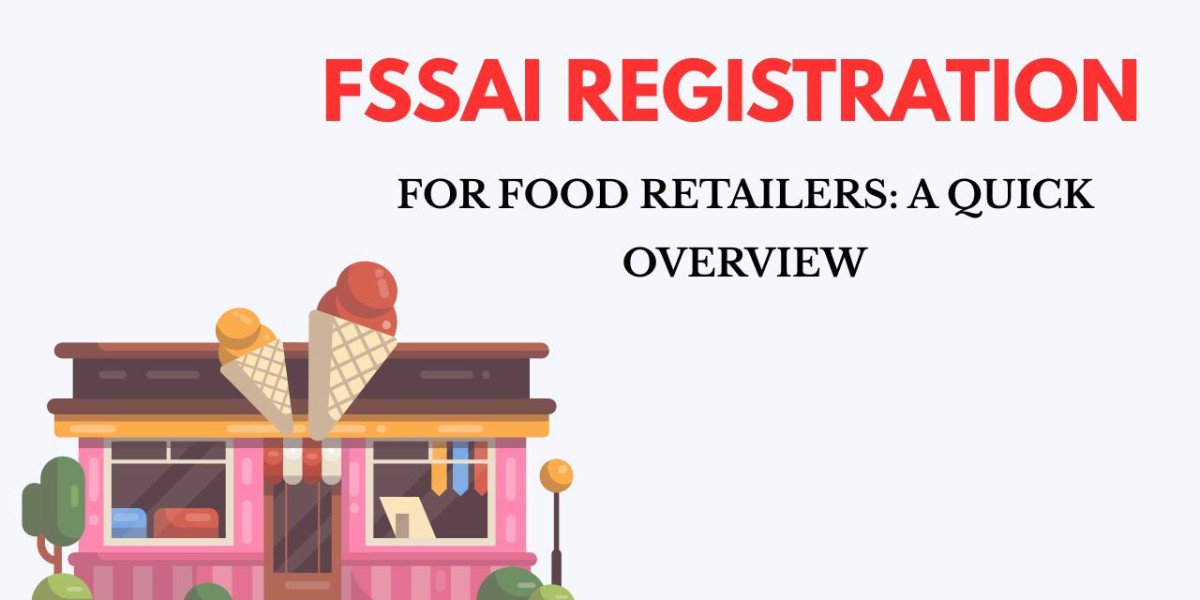The Food Safety and Standards Authority of India (FSSAI) is the regulatory body that oversees food safety and quality in India. It ensures that food products are safe for consumption by implementing and enforcing various standards. FSSAI Registration is mandatory for food businesses, including food retailers, to operate legally and ensure that they are adhering to food safety norms.
What is FSSAI Registration?
FSSAI registration is the process through which food businesses, including food retailers, obtain a license from the Food Safety and Standards Authority of India. This license certifies that the business complies with the food safety standards set by the authority.
The FSSAI is responsible for regulating and monitoring the production, distribution, sale, and consumption of food in India. The registration ensures that food retailers maintain hygiene and provide safe and nutritious food products to consumers.
Why is FSSAI Registration Important for Food Retailers?
FSSAI registration plays a crucial role in ensuring the safety and quality of food sold to consumers. There are several reasons why FSSAI registration is essential for food retailers:
Legitimacy and Compliance: FSSAI registration is a legal requirement for food retailers. It ensures that the business is operating in compliance with the Food Safety and Standards Act, 2006, and other regulations laid down by FSSAI.
Consumer Trust: Having an FSSAI registration number helps build consumer trust. It shows that the retailer is committed to selling safe and high-quality food products. Consumers are more likely to buy from food retailers who are FSSAI-certified, as it assures them of the safety and hygiene of the food they consume.
Business Growth: An FSSAI registration allows food retailers to expand their business. Without registration, a business may face legal issues, penalties, and fines, which could hinder growth. FSSAI registration allows retailers to operate smoothly and access new markets.
Quality Control: FSSAI standards ensure that food retailers maintain hygiene and quality in their operations. Retailers must follow the guidelines for food storage, handling, and distribution to prevent contamination and ensure consumer safety.
Avoiding Legal Penalties: Food retailers who fail to obtain FSSAI registration or a license may face penalties, fines, or even business closure. FSSAI registration is a necessary step for food businesses to avoid such legal complications.
International Trade: If a food retailer plans to export food products internationally, FSSAI registration is often a requirement. It helps in meeting international food safety standards, making it easier for businesses to expand globally.
Types of FSSAI Registration for Food Retailers
FSSAI registration for food retailers depends on the size and nature of their business. There are three main categories of FSSAI registration:
Basic Registration: This type of registration is for small food businesses or food retailers with a turnover of less than ₹12 lakhs annually. It is the most basic form of registration and is ideal for small-scale retailers such as local grocery shops or small food stalls.
State License: Food businesses with a turnover between ₹12 lakhs and ₹20 crores annually need to apply for a state license. This is suitable for medium-sized food retailers or businesses that deal with larger quantities of food products.
Central License: This type of license is required for food businesses with a turnover exceeding ₹20 crores annually or those involved in interstate or international food trade. Large-scale food retailers, food chains, and distributors typically fall under this category.
FSSAI Registration Process for Food Retailers
The FSSAI registration process is straightforward and can be completed online. The steps involved in the registration process are as follows:
Visit Website – Open the official FSSAI registration portal.
Fill Application Form – Enter your name, business details, and food category, and upload your PAN card.
Review & Submit – Check all details and submit the form.
Pay Fee – Complete the payment online as per your license type.
Verify OTP – Enter the OTP sent to your registered mobile or email.
Inspection (If Required) – Officials may inspect your premises for approval.
Get an FSSAI License – Download your FSSAI license from the website once approved.
Documents Required for FSSAI Registration
Food retailers need to submit the following documents to complete the FSSAI registration process:
A copy of the identity proof of the business owner (Aadhar card, voter ID, passport, etc.)
Proof of the business address (electricity bill, rent agreement, etc.)
A passport-sized photograph of the applicant
Food safety management plan (if applicable)
Proof of food safety training (for certain categories of food businesses)
GST registration (if applicable)
Any other specific documents based on the type of business
Benefits of FSSAI Registration for Food Retailers
Legal Compliance: FSSAI registration ensures that food retailers comply with the laws and regulations regarding food safety. It reduces the risk of facing legal issues and penalties.
Increased Consumer Confidence: FSSAI certification is a symbol of quality and safety. It helps build consumer trust, as customers are more likely to buy from retailers that follow proper safety standards.
Business Expansion: FSSAI registration opens up new opportunities for food retailers. It makes it easier to access new markets and expand the business, both domestically and internationally.
Improved Food Safety: By adhering to FSSAI guidelines, food retailers are required to maintain cleanliness, hygiene, and quality in their operations. This improves food safety and minimizes the risk of contamination.
Competitive Advantage: In a competitive market, having an FSSAI registration gives food retailers an edge over others. It helps in attracting more customers who prioritize food safety and quality.
Better Supply Chain Management: FSSAI registration ensures that food retailers follow proper procedures for the sourcing, storage, and handling of food products. This improves the efficiency of the supply chain and reduces wastage.
Access to Government Tenders: For food retailers who wish to supply food products to government agencies, FSSAI registration is mandatory. It is required to participate in government tenders and contracts.
Suggested read: Renewing and Upgrading Your FSSAI License
Conclusion
FSSAI registration is a vital step for food retailers to operate legally and maintain high standards of food safety. It helps ensure consumer safety, improve business operations, and build consumer trust. The process of registration is simple and can be completed online, making it accessible to food retailers of all sizes.
By obtaining FSSAI registration, food retailers can enhance their reputation, expand their business, and contribute to the overall improvement of food safety standards in India. Whether you run a small food store or a large retail chain, FSSAI registration is an essential requirement to stay compliant with the law and provide safe food to your customers.







